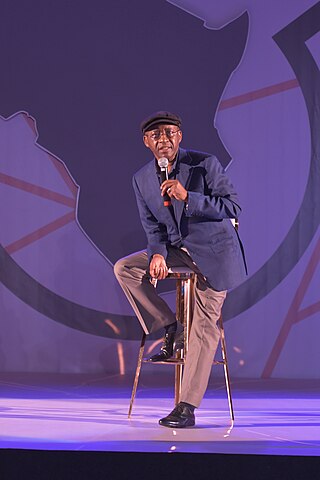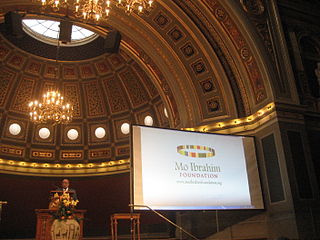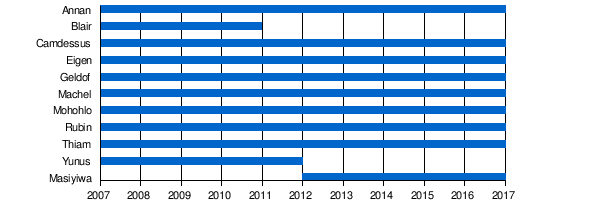
Kofi Atta Annan was a Ghanaian diplomat who served as the seventh secretary-general of the United Nations from 1997 to 2006. Annan and the UN were the co-recipients of the 2001 Nobel Peace Prize. He was the founder and chairman of the Kofi Annan Foundation, as well as chairman of The Elders, an international organisation founded by Nelson Mandela.

Robert Frederick Zenon Geldof is an Irish singer-songwriter and political activist. He rose to prominence in the late 1970s as the lead singer of the Irish rock band the Boomtown Rats, who achieved popularity as part of the punk rock movement. The band had UK number one hits with his co-compositions "Rat Trap" and "I Don't Like Mondays". Geldof starred as Pink in Pink Floyd's 1982 film Pink Floyd – The Wall. As a fundraiser, Geldof organised the charity supergroup Band Aid and the concerts Live Aid and Live 8, and co-wrote "Do They Know It's Christmas?", one of the best-selling singles to date.

Chief Olusegun Matthew Okikiola Ogunboye Aremu Obasanjo is a Nigerian general and statesman who served as Nigeria's head of state from 1976 to 1979 and later as its president from 1999 to 2007. Ideologically a Nigerian nationalist, he was a member of the Peoples Democratic Party (PDP) from 1998 to 2015, and since 2018.

Joaquim Alberto Chissano is a politician who served as the second President of Mozambique, from 1986 to 2005. He is credited with transforming the war-torn country of Mozambique into a successful African democracy. After his presidency, Chissano became an elder statesman, envoy and diplomat for both his home country and the United Nations. Chissano also served as Chairperson of the African Union from 2003 to 2004.

Luísa Dias Diogo is a Mozambican politician who served as Prime Minister of Mozambique from February 2004 to January 2010. She replaced Pascoal Mocumbi, who had been prime minister for the previous nine years. Before becoming prime minister, she was Minister of Planning and Finance, and she continued to hold that post until February 2005.

Graça Machel is a Mozambican politician and humanitarian. She is the widow of former President of Mozambique Samora Machel (1975–1986) and former President of South Africa Nelson Mandela (1998–2013). Machel is an international advocate for women's and children's rights and was made an honorary Dame Commander of the Order of the British Empire by Queen Elizabeth II in 1997 for her humanitarian work. She is the only woman in modern history to have served as First Lady of two countries, South Africa and Mozambique.

Strive Masiyiwa is a London-based Zimbabwean billionaire businessman and philanthropist. He is the founder and executive chairman of international technology groups Econet Global and Cassava Technologies.
The Commission for Africa, also known as the Blair Commission for Africa, was an initiative established by the British government to examine and provide impetus for development in Africa. Initiated in Spring 2004, its objectives include the generation of new ideas for development and to deliver implementation of existing international commitments towards Africa. African leaders form a majority of the 17 commissioners.

Peter Eigen is a lawyer, development economist and civil society leader.

Tidjane Thiam is an Ivorian and French businessman, and the executive chairman of Freedom Acquisition Corp. He was the chief executive officer (CEO) of Swiss bank Credit Suisse from March 2015 to February 2020. He was the chief financial officer of British banking group Prudential from 2007 to 2009, and then its CEO until 2015. In 2019, Thiam became a member of the International Olympic Committee (IOC).

The Elders is an international non-governmental organisation of public figures noted as senior statesmen, peace activists and human rights advocates, who were brought together by Nelson Mandela in 2007. They describe themselves as "independent global leaders working together for peace, justice, human rights and a sustainable planet". The goal Mandela set for The Elders was to use their "almost 1,000 years of collective experience" to work on solutions for seemingly insurmountable problems such as climate change, HIV/AIDS, and poverty, as well as to "use their political independence to help resolve some of the world's most intractable conflicts".

The Mo Ibrahim Foundation is an African non-grant foundation founded in 2006 by businessman Mo Ibrahim. Headquartered in London and Dakar, Senegal, it works to strengthen governance and leadership in Africa through its key initiatives:
The Global Humanitarian Forum was a non-profit foundation in Geneva, Switzerland, active from 2007 to 2010. Presided over by former United Nations Secretary General Kofi Annan, its secretariat was established by Meinrad Studer, assigned by the SDC. Subsequently, the forum was led by CEO and Director General Walter Fust. The Forum intended to serve as an independent platform for debate and collaboration on global humanitarian issues. Its activities included research projects, advocacy and projects to deal with humanitarian concerns.

Linah Kelebogile Mohohlo was a Botswana banker and university chancellor. She was the first female Governor of the Bank of Botswana from 1999 to 2016. She was also the first female Chancellor of the University of Botswana, serving from 2017 to 2021.
AGRA,formerly known as the Alliance for Green Revolution in Africa is an African-led African-based organization that seeks to catalyse Agriculture Transformation in Africa. AGRA is focused on putting smallholder farmers at the centre of the continent's growing economy by transforming agriculture from a solitary struggle to survive into farming as a business that thrives. As the sector that employs the majority of Africa's people, nearly all of them small-scale farmers, AGRA recognizes that developing smallholder agriculture into a productive, efficient, and sustainable system is essential to ensuring food security, lifting millions out of poverty, and driving equitable growth across the continent.

United Nations Security Council Resolution 1689, adopted unanimously on June 20, 2006, after recalling all previous resolutions on the situation in Liberia and West Africa, the Council decided to continue sanctions against the import of diamonds from the country for six months, though similar restrictions relating to timber imports were lifted.
Several Eminent Persons Groups, abbreviated to EPG, have been founded by the Commonwealth of Nations.

The Kofi Annan Foundation is an independent, not-for-profit organisation whose mission is to help build peaceful, democratic and resilient societies. It was founded and legally incorporated in Switzerland in 2007 by the late Kofi Annan, former secretary general of the United Nations.

Caroline Kende-Robb is a Senior Adviser at the African Center for Economic Transformation, a Pan-African think tank influencing policy across Africa and globally to support Africa’s long-term growth through transformation.
The West Africa Commission on Drugs was launched by the Kofi Annan Foundation in 2014. Olusegun Obasanjo chaired the commission.

















